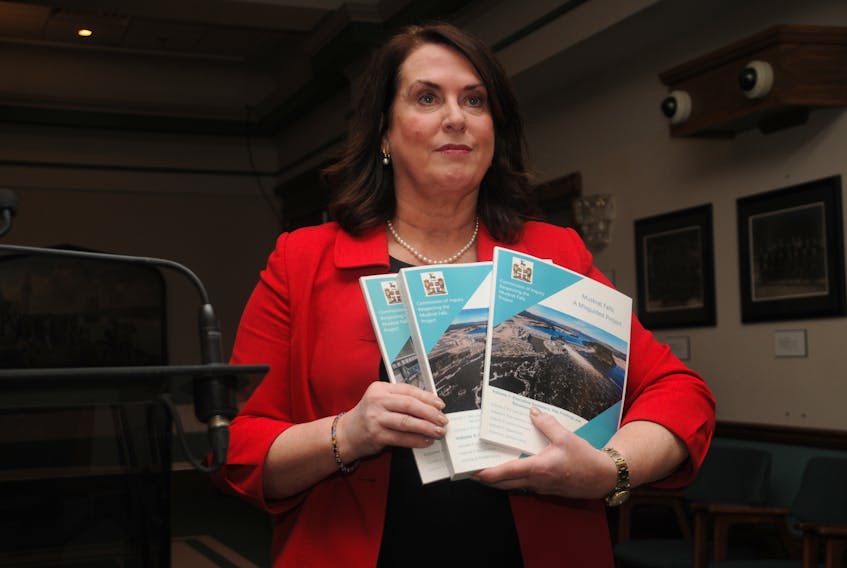“For there to be betrayal, there would have to have been trust first.” — Suzanne Collins, “The Hunger Games”
The Muskrat Falls Inquiry report is a tragicomedy in several acts, but no one’s laughing.
In six volumes, Justice Richard LeBlanc lays out how and why the Muskrat Falls hydroelectric project went astonishingly over budget and behind schedule, with a clarity and precision that were sadly lacking in both project planning and execution.

It should be recommended reading for everyone in this province, starting with politicians. In fact, they should be tested on it.
Titled “Muskrat Falls: A Misguided Project,” it might have been equally aptly labelled: “So, you want to build a megaproject. Here’s what not to do.”
There’s been plenty of reaction, and much of it what you would expect from the key players — a lot of “well, I did all the right things based on what I knew,” and “well, it’s easy to say those things in hindsight.”
It’s left me feeling a strong sense of betrayal.
As LeBlanc writes, “Unfortunately, as is set out in this report, the leadership of both the government of Newfoundland and Labrador and of Nalcor failed in its responsibilities to the citizens of the province.”
Let me be clear here. I don’t think the politicians involved in Muskrat Falls set out to bankrupt citizens or the public purse. I don’t believe anyone at Nalcor or in the civil service was aiming for that.
But I do believe that some people in key positions put self-interest ahead of the greater good, whether that was driven by political power, professional ambition, financial goals, ego gratification, visions of Valhalla, or what have you.
There were too many eyes on the prize and not enough eyes on the ground, doing the diligence needed to determine whether Muskrat Falls actually was the best option to meet the province’s energy needs.
Titled “Muskrat Falls: A Misguided Project,” it might have been equally aptly labelled: “So, you want to build a megaproject. Here’s what not to do.”
Musing about why the project ever got sanctioned, current Nalcor CEO Stan Marshall once told me, “Whatever the question was, Muskrat Falls was the answer.”
Former Nalcor CEO Ed Martin, to his credit — given how prominently he figured in LeBlanc’s scathing summing-up — did media interviews this week and answered the questions put to him.
Yet the statement he issued reveals his persistent inability to distinguish between the Muskrat Falls we were promised and the behemoth that now threatens to flatten us financially.
He said of the public inquiry, “I realized the Commissioner had made up his mind well before hearing all the evidence, and that the content, tone and direction of the report was already formed, thereby providing an indication of early bias and a harbinger of what was to come.”
Funny, that’s exactly the kind of “early bias” LeBlanc said had propelled Muskrat Falls in the first place.
Perhaps the most poignant comment I’ve heard so far has been from retired civil servant Ron Penney, who was part of the Concerned Citizens Coalition — a group of credible critics of the project who were excoriated by politicians during the early days of Muskrat Falls for daring to question its viability.
Rather than savour any feeling of vindication in LeBlanc’s findings — which, frankly, he could be forgiven for doing — Penney says he and fellow concerned citizen David Vardy wished the report didn’t prove them right in many ways.
“No, we both wish that predictions didn’t come true,” he told The Telegram this week.
“And our big regret is that we weren’t able to do enough to get more people concerned about the project. In that sense we really failed. We weren’t good enough to accomplish the job of getting people to take a second look at it.”
You can’t help but wonder if we might be in a far better state if some of the architects of our multi-billion-dollar boondoggle had had a little more of that humility and a little less hubris.
It’s telling, isn’t it, when citizens who have no personal, political or professional stake in something are willing to put their necks on the line to try and protect the public interest when the people entrusted with that very responsibility aren’t willing to do the same.
Pam Frampton is The Telegram’s managing editor. Email [email protected]. Twitter: pam_frampton









